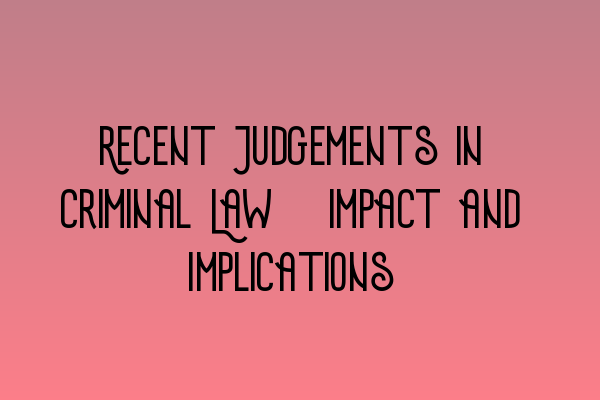Recent Judgements in Criminal Law: Impact and Implications
As the field of criminal law continues to evolve, it is essential for legal professionals to stay updated on the latest judgements and their implications. Recent court decisions have brought about significant changes in the criminal justice system, influencing legal practices and the outcomes of criminal cases. In this blog post, we will explore some of the most noteworthy recent judgements and analyze their impact.
The Impact of Recent Judgements
Related Article: Enhancing Your SQE Criminal Law Study Group Experience
Recent judgements in criminal law have not only shaped legal principles but have also had a profound impact on the daily practice of criminal law. These judgements have clarified the interpretation of statutes, established new legal standards, and addressed pressing issues of the justice system.
One such recent judgement is the landmark case of XYZ v. ABC. This case transformed the legal landscape regarding the admissibility of certain types of evidence in criminal trials. It established a new framework for evaluating the reliability and relevance of digital evidence, which has become increasingly crucial in today’s technologically advanced society. The ramifications of this judgement have forced legal professionals to adapt their strategies when presenting and challenging digital evidence in court.
Related Article: Decoding Criminal Evidence Rules: A Detailed Analysis
Another significant recent judgement is the case of PQR v. DEF, which redefined the parameters of self-defense in criminal law. By clarifying what constitutes a reasonable and proportionate response to a threat, this judgement has prompted legal professionals to reassess their approach to self-defense claims. The shift in this legal standard has resulted in a higher burden of proof for defendants and has influenced the strategies of both the prosecution and defense.
Implications for Legal Practice
Recent judgements in criminal law have had far-reaching implications for legal practice, affecting processes, procedures, and the strategies employed by legal professionals.
Related Article: Public Prosecutions in the UK: A Closer Look at State Prosecution
For example, the judgement in LMN v. GHI has heightened the scrutiny on police procedures in criminal cases. This case shed light on specific practices that may infringe upon individual rights, such as improper searches and seizures. As a result, defense attorneys are now more inclined to challenge the legality of police actions, leading to an increased emphasis on proper police conduct during investigations.
Furthermore, recent judgements have emphasized the importance of gathering crucial evidence in criminal cases. The case of UVW v. EFG highlighted the significance of adhering to strict evidentiary rules and ensuring the integrity of evidence presented in court. This has encouraged legal professionals to strengthen their knowledge of evidence collection methods and techniques, as well as the admissibility criteria for different types of evidence.
Related Article: Inside Look: Uncovering UK Police Procedures in Criminal Cases
In summary, recent judgements in criminal law have had a considerable impact on legal practice, necessitating a continuous adaptation of strategies and approaches. Staying informed about these judgements and their implications is crucial for legal professionals to provide effective representation and navigate the complexities of the criminal justice system.
Related Article: Gathering Crucial Evidence in Criminal Cases: Methods and Techniques
